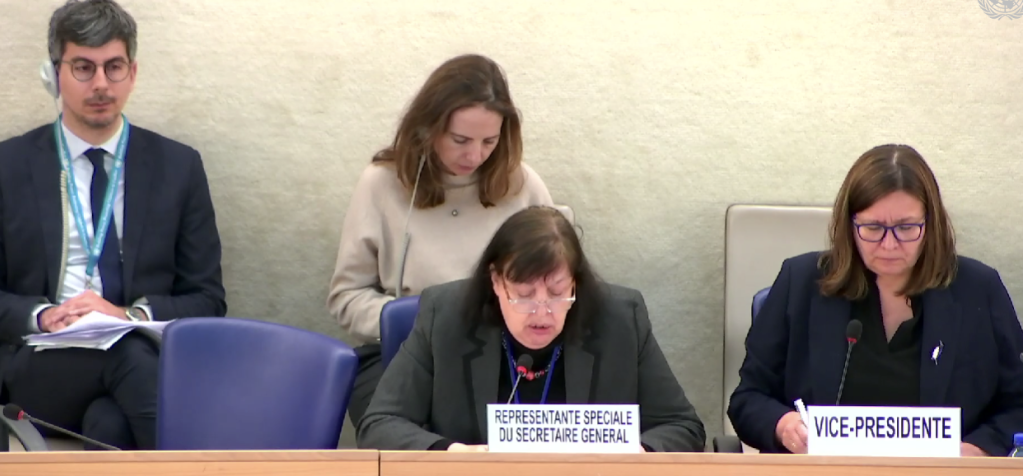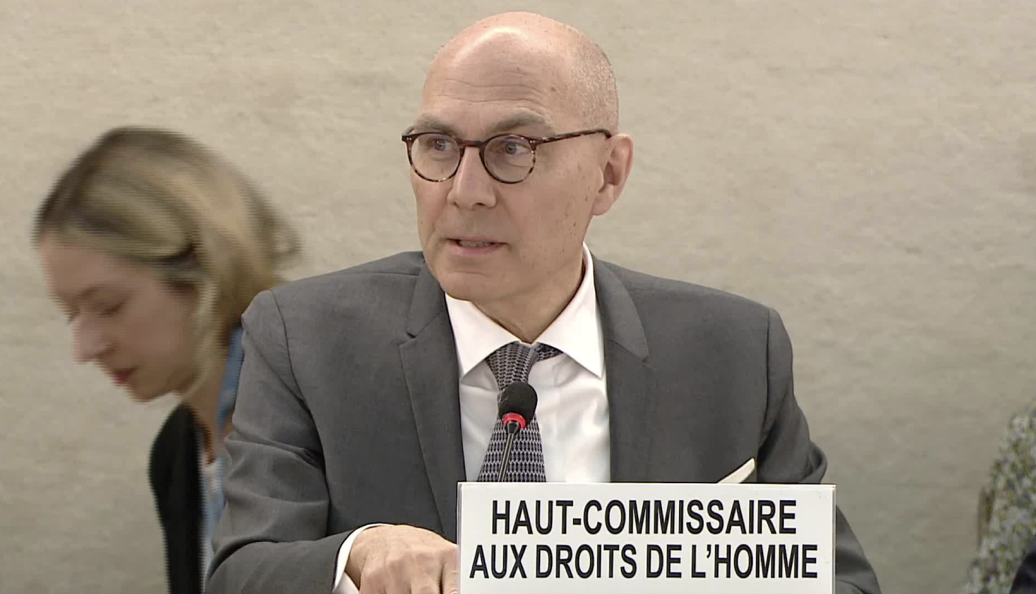By Shyla Gheek/GICJ
7 October 2024 marked the first birthday of a Palestinian child, Mohammed Abu Nahleh, who has yet to experience a single day of normalcy or a life of dignity. In an interview, his mother, Amal al-Abadlah, expressed her gratitude for the birth of her child during the harrowing sounds of air strikes and the overcrowded hospital.[1] Over the past year, the relief of his birth during the high-risk pregnancy has now been overcome by fear for his life.
Among the Gaza population, around 572,000 women and girls are in need of accessing reproductive health services. According to the United Nations Sexual and Reproductive Health and Rights Agency (UNFPA), an estimated 50,000 pregnant women are caught up in the war and do not have access to medical care in Gaza[2], causing an overall 300% rise in miscarriages.[3]
Philippe Lazzarini, the Commissioner General of the United Nations Relief and Works Agency for Palestine Refugees in the Near East (UNRWA), has repeatedly stated that this has become a war on children, irreversibly damaging their childhoods and their futures. Children brought into the world are brought into a life of continuous fear with the singular goal of survival. As of date statistics, out of the estimated 41,909 people killed in Gaza since 7 October 2023, 16,756 were children, and 11,346 were women, both of which overall account for 69% of the victims.[4] More than 350,000 children have been displaced from their homes,[5] and removed of their right to safety, access to healthcare, right to education, and ability to feel any form of peace.
Direct and targeted attacks on children have only continued to increase during this war. For example, on the 373rd day after the escalation of the ongoing genocidal war in Gaza, Israeli occupation forces added to their list of atrocities by launching a direct attack on a group of children playing in a neighbourhood in the al-Shati refugee camp located near the Gaza City coastline.[6]
The war has already displaced one million children from their homes, including approximately 17,000 who are unaccompanied or separated from their families—representing one per cent of the 1.7 million displaced Gazans.[7]
As reported by Geneva International Centre for Justice (GICJ), during the Human Rights Council (HRC) meeting in March 2022, Ms Rana Arrabi, speaking on behalf of the State of Palestine, expressed concern over the lack of action taken to address the suffering of children under occupation.[8] Two years later, Palestinian children are the daily targets of violence despite being considered a vulnerable group protected under international laws and norms.
Ironically, Israel showcased support for protecting Palestine children at the HRC meeting in March 2024, stating that “children are not pawns of war”;[9] however, innocent children have been displaced, killed, seriously injured, and worse. Furthermore, there is a constant record of demolished schools and hospitals in Gaza, preventing Palestinian children from exercising the two fundamental rights to education and healthcare.
Education:
Half of the Gazan population is made up of children who have not been able to attend school for over a year due to the devastating war. The decreasing access to education is going to impact children’s mental health and development, which further risks their prospects and goals. 45,000 six-year-old children in the Gaza Strip have been deprived of the right to begin their 2024 school year. They joined the 625,000 children who were already denied an entire year of schooling with the risk of missing out on a second school year.[10] Falling back on years of progress in the Gaza Strip, 39,000 students missed their final year of school, marking the first time in decades that a graduating class in Gaza was unable to complete their schooling.
During an interview, Philippe Lazzarini warned that shattered classrooms in Gaza are equivalent to an entire “lost generation.”[11] With over 123 schools and universities destroyed,[12] Lazzarini advised that education needs to be made a collective and common priority for all. UNRWA reported that on 27 September 2024, three of UNRWA’s schools, which harboured 20,000 people, had been hit, killing 20 people.[13] An estimate of at least 87% of school buildings all over Gaza have been severely damaged in the 365 days since the first attack on October 7th, 2023.[14]
For over 75 years of their work with Palestinians, UNRWA has been determined to provide children with primary education and remain tethered to this goal. Similarly, UNICEF Middle East and North Africa Regional Director Adele Khodr has stressed the urgency of bringing education and recreational supplies into Gaza, and improving safety for staff and students to prevent an overall loss of learning. [15]
Health
A place of destruction, decreasing hygiene, and lack of medical care is no place for children, and their safety has continued to be placed at risk as the humanitarian crisis deepens. They have lost access to water, food, medicine, and proper hygiene.
It is essential to draw attention to the recent polio outbreak in Gaza. Philippe Lazzarini referred to this outbreak as a “total disgrace” as polio had been eradicated in Gaza over 25 years ago.[16] Merely ten months after the beginning of the war, the dropping sanitary conditions led to a rise in rates of polio among children. The polio campaign by UNRWA and UNICEF came with unprecedented challenges. For example, 75% of the pre-existing cold chains, deemed important for any form of immunisation campaign, had been destroyed in one year of the war. Henceforth, 1.6 million vaccines were refrigerated and brought to Gaza during the first round of polio vaccines in September 2024.[17]
Additionally, operational difficulties included the mass and endless displacement of children, which made it challenging to administer the vaccine along with the preventive Vitamin A vaccines to at least 90% of the children in Gaza. The vaccine campaign was broadcast via SMS, radio, and other digital channels in Gaza to spread the message to the mass population. However, during a press briefing on 11 October 2024, UNICEF Special Representative in the State of Palestine, Jean Gough, emphasised the importance of localised humanitarian pauses as a prerequisite for a successful round of vaccination against polio in Gaza.[18]
The crime of starvation and increasing rates of malnutrition have led to famine being declared in the Gaza Strip. The rise in food insecurity has become a weapon of war against all groups, especially children,[19] as UNICEF has raised concerns that young people are particularly vulnerable to hunger and disease.[20]
Geneva International Centre for Justice (GICJ) is deeply troubled by the devastating impact that conflicts and wars have on children, particularly those who have been displaced multiple times, lost their homes, or are mourning the loss of parents and loved ones. Whether as collateral or direct targeting, war on children is in complete violation of the United Nations Convention on the Rights of the Child (UNCRC) international treaty. Schools, as sanctuaries of learning, must never become targets of attack or be used for military purposes by any party. Children are always the first and most affected; therefore, they deserve protection and support. There is life growing in the centre of death, and we urge the international community to take concrete steps to safeguard the safety, well-being, and future of children, ensuring that their fundamental rights are upheld and those responsible for violations are held accountable. We call upon States to advocate for humanitarian pauses in the Gaza conflict to protect the future of children. These pauses are essential to ensure children have access to safe spaces for education, proper healthcare, and the opportunity to grow without the threat of violence. Children must not continue to be casualties of war; their well-being and future must be a priority.
[1]https://www.aljazeera.com/program/newsfeed/2024/10/10/a-palestinian-mothers-year-of-resilience-after-giving-birth-oct-7-2023
[2]https://usaforunfpa.org/women-and-girls-in-crisis-in-gaza/
[3] https://www.aljazeera.com/program/newsfeed/2024/10/10/a-palestinian-mothers-year-of-resilience-after-giving-birth-oct-7-2023
[4] https://www.aljazeera.com/news/longform/2024/10/8/one-year-of-israels-war-on-gaza-by-the-numbers
[5] https://news.un.org/en/story/2024/10/1155501
[6] https://english.almayadeen.net/news/politics/israeli-forces-massacre-children-in-gaza--besiege-hospitals
[7] https://turkiye.un.org/en/263401-gaza-number-children-killed-higher-four-years-world-conflict
[8] https://www.gicj.org/conferences-meetings/human-rights-council-sessions/discussion-reports/2673-hrc49-exacerbated-challenges-for-children-in-armed-conflict
[9] https://www.gicj.org/conferences-meetings/human-rights-council-sessions/discussion-reports/3741-hrc-55-children-and-armed-conflict
[10] https://www.unicef.org/press-releases/45000-first-graders-unable-start-new-school-year-gaza-strip-unicef
[11] https://news.un.org/en/audio/2024/09/1154826
[12] https://www.aljazeera.com/news/longform/2024/10/8/one-year-of-israels-war-on-gaza-by-the-numbers
[13] https://news.un.org/en/story/2024/10/1155371
[14] https://www.unicef.org/
[15] https://www.unicef.org/press-releases/45000-first-graders-unable-start-new-school-year-gaza-strip-unicef
[16] https://news.un.org/en/audio/2024/09/1154826
[17] https://www.unicef.org/press-releases/geneva-palais-briefing-note-announcement-second-round-polio-vaccination-gaza-strip
[18] https://unicef.org/press-releases/geneva-palais-briefing-note-announcement-second-round-polio-vaccination-gaza-strip
[19] https://www.gicj.org/topics/countries/palestine/3712-in-light-of-israel%E2%80%99s-increasing-starvation-crimes,-famine-in-gaza-strip-must-be-officially-declared
[20] https://turkiye.un.org/en/263401-gaza-number-children-killed-higher-four-years-world-conflict







